|
|
|
Sort Order |
|
|
|
Items / Page
|
|
|
|
|
|
|
| Srl | Item |
| 1 |
ID:
192178
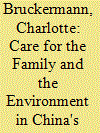

|
|
|
|
|
| Summary/Abstract |
In the “coal province” of Shanxi, residents grapple with tensions between caring for their families and caring about their environment. In creating ethical pathways through care, residents must navigate the paradox of livelihoods dependent on forms of development that endanger lives and pollute environments. This dilemma has crystallized over time, as the personal and particular demands of the present have become enmeshed with long-standing concerns over environmental degradation. Rather than characterizing family care as concrete and environmental care as abstract, acts of care in Shanxi link the reproductive crisis of the family with the reproductive crisis of the environment: the article presents instances under which the attention, empathy and recognition of care for concrete others are scaled up to the levels of ecology and planetary crisis.
|
|
|
|
|
|
|
|
|
|
|
|
|
|
|
|
| 2 |
ID:
170470
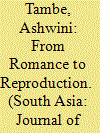

|
|
|
|
|
| Summary/Abstract |
This essay takes up for analysis how couples were represented in the cover art of the Marathi women’s magazine, Stree, from 1935 to 1965. Stree was the longest continuously running women’s magazine in Marathi (published from 1930 to 1986) and had a strong visual identity that benefited from cover images painted by noted artists. I focus here on a contrast that is evident between how couples were represented before and after Independence. Between 1935 and 1947, the hallmark image on the covers was the romantic couple, with alluring women as central figures. After Independence, between 1947 and 1965, the romantic couple receded from view and was replaced by scenes of comfortable and responsible mothering and domesticity. Depictions of premarital romance dropped, and women became components in a household tableau rather than the focus of romantic pursuit. In contrast with the Anglicised notions of glamour used in the 1930s, we also find a more explicitly Hindu aesthetic in the frequent representations of religious rituals and weddings. I treat these changing themes as an expression of the visual idiom of nation-building in mid twentieth century India. The increasing Hinduisation of couples in Stree covers reflects a post-Partition ethos of channelling conjugality along specifically majoritarian religious lines. The shunning of frivolity and the turn towards family and nation-building in this cultural text illustrates, in effect, how nationalism can shore up and promote very segregated gender relations.
|
|
|
|
|
|
|
|
|
|
|
|
|
|
|
|
| 3 |
ID:
188184
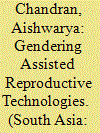

|
|
|
|
|
| Summary/Abstract |
Literature on commercial surrogacy argues that assisted reproduction technologies (ARTs) problematise presumed essentialist dichotomies of nature and culture. While technologies of commercial surrogacy naturalise the medicalisation of the body, these technologies in turn also produce new knowledge about the biological facts of the body. In what ways are knowledge about reproductive labour and women’s reproductive capacities embedded in these technologies? How do these technologies invite us to imagine maternal bodies? Under regimes of stratified reproduction that inflect reproductive bodies with caste, class and racial politics, how do we read the production of the gendered body within commercial gestational surrogacy practices? The paper draws on ethnographic research conducted in Mumbai to study how technologies of commercial surrogacy interact with the normative idioms of conception. I will attempt to show how assumptions about gendered bodies and gendered roles are embedded within the material teleologies of these technologies, which in turn produce newer material-semiotic significations of the reproductive body.
|
|
|
|
|
|
|
|
|
|
|
|
|
|
|
|
| 4 |
ID:
183223
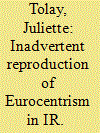

|
|
|
|
|
| Summary/Abstract |
The study of Eurocentrism has become a hallmark of postcolonial International Relations theories. Of particular concern in this literature has been the resilience of Eurocentrism despite conscious efforts to move towards a post-Eurocentric understanding of world politics. This study argues that while existing works have highlighted many of the reasons why Eurocentrism persists today, it has not been sufficiently identified and conceptualised. In particular, why some policy actors, who have a vested interest in moving beyond Eurocentrism, inadvertently reproduce Eurocentrism? This article proposes to distinguish between different types of inadvertent reproductions. In particular it highlights rhetorical critique, deconstruction, decentring and dehierarchising, as different ways to critique, inadvertently reproduce and partially modify Eurocentrism. To illustrate this situation, this article looks at Turkey's migration policies and documents how Turkish governing elites have openly claimed the need to upend the Eurocentric order, yet have reproduced it in practice.
|
|
|
|
|
|
|
|
|
|
|
|
|
|
|
|
| 5 |
ID:
193040
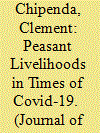

|
|
|
|
|
| Summary/Abstract |
The Covid-19 pandemic has had unprecedented global impact, creating multiple crises that have gone beyond the epidemiological, extending to the socio-economic and political. It has exposed structural flaws in global capitalism and intensified inequalities that have traditionally been imbedded in relations of production and social reproduction. In emerging Covid-19 literature, blind spots exist on its impact on peasant households. It is this knowledge gap that this article fills. Focusing on an agrarian context in rural Zimbabwe, the article employs a classical agrarian perspective and the political economy approach as conceptual and heuristic tools to explore the impact which this novel virus has had on rural livelihoods. It shows that the pandemic has impacted agricultural production, social reproduction, labour relations and asset accumulation. While its impact has been largely negative, opportunities were created with peasant agency being critical in dealing with shocks and vulnerabilities.
|
|
|
|
|
|
|
|
|
|
|
|
|
|
|
|
| 6 |
ID:
144761
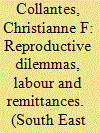

|
|
|
|
|
| Summary/Abstract |
This paper explores the reproductive dilemmas of individuals from a communal compound in Cavite, which are impacted by the complicated intersection of economic globalization and prescriptions of gendered performances and spatialities. Specifically, it looks at how remittances from overseas Filipino worker (OFW) relatives and the personal desires for overseas mobility directly shape these individuals' decisions regarding reproduction, relationships and intimacies. Wilson's (2004) concept of intimate economies helps to frame and theoretically encase the ongoing dialogue between global labour economies and personal intimacies related to reproduction and family planning. Ethnographic data and narratives were collected while the Philippines' Reproductive Health Law (commonly known as the RH Law) was being passed in December 2012. As it mandates public access to reproductive health services including artificial contraceptives, sex education and maternal care, the RH Law continues to face strong opposition from leaders of the Philippine Catholic Church and formidable 'Anti-RH' movements (approximately 81% of Filipinos identify themselves as Roman Catholic). This article highlights how reproductive dilemmas are dictated not only by religious beliefs and practices, but also by gendered and economic arrangements against a backdrop that is both politically polemical and rapidly globalizing.
|
|
|
|
|
|
|
|
|
|
|
|
|
|
|
|
|
|
|
|
|